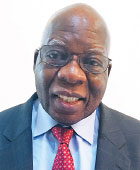Tribute to Chief Patricia (Nana) Newton

Patricia Newton M.D., M.P.H., M.A., was a legendary figure. She grew up in Arkansas, attended Washington University Medical School in St. Louis, and settled in the Baltimore and Washington, D.C., areas, where she rightly became an institution. Her sudden departure was a major blow to all who knew her.
Chief Nana, as she was affectionately known by her Ghanaian title, was an affable individual with a distinctly superb intellect. She always looked resplendent in the gold colors of ceremonial Ghanaian outfits. A champion of social justice, Nana was politically astute and a master debater and preached the need to be humble with the proper decorum and language while negotiating the morass of racism and discrimination. Her positions were clear and uncompromising. She had the ability to reduce the tensions that usually accompany discussions of race and discrimination, usually concluding such occasions on a lighter note.
Nana had a broad range of interests. She was a repository of African traditions and beliefs and the legacy of slavery. She fused African traditions and Western culture into an authentic synthesis. Her research was equally broad ranging, focusing on such topics as the effects of early childhood trauma, the effects of slavery, and female genital circumcision. Her work comprised not mere esoteric and theoretical concepts but addressed issues that she cared very much about.
Nana was a past president of the Black Psychiatrists of America (BPA) and its CEO and medical director. Her performance in these roles can be described as incompensable, considering the time and effort she invested in running the BPA. She brought international recognition to the BPA by the frequent transcultural conferences she organized in various places; to name a few: Senegal, Cuba, the Bahamas, Egypt, Jamaica, and Barbados. These trips usually resulted in bringing together diasporic populations and eliciting lots of nostalgia. Her presentation at a transcultural psychiatry conference in Kingston, Jamaica, last year was described as electrifying, resulting in a cadre of admirers from the transcultural group at McGill University.
Nana was an epitome of humility, goodwill, and a sense of humor. She leaves an unfillable hole in psychiatry and the hearts of those who knew her. ■



